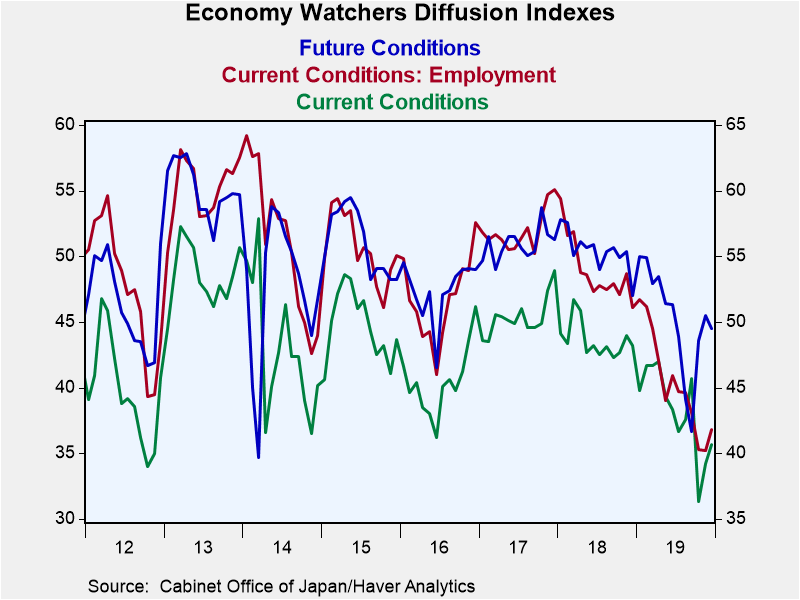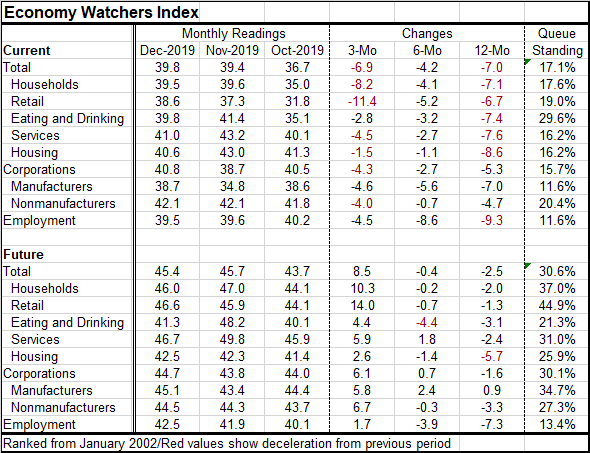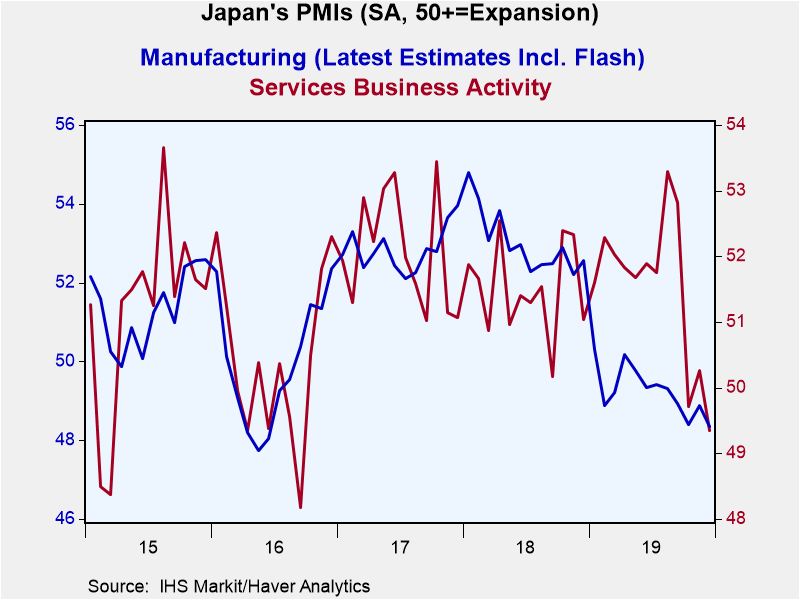 Global| Jan 14 2020
Global| Jan 14 2020Japan's Economy Watchers Index Is Mixed
Summary
Japan's economy watchers index is mixed in December. The current index improved slightly while the future index decayed slightly. More broadly, the current index declines over three months, over six months and 12 months. The drop in [...]
 Japan's economy watchers index is mixed in December. The current index improved slightly while the future index decayed slightly. More broadly, the current index declines over three months, over six months and 12 months. The drop in points over three months is -6.9 points, nearly the same as the 7-point drop over 12 months. Of the nine readings in the current index (some of them aggregations), all show declines over three months and six show accelerating declines over three months compared to over six months. All nine show declines over six months as well as over 12 months. The weakness in the current index is broad and unmistakable. The economy watchers index and its current components have weak queue standings. The current index with a 17.1 percentile standing has been weaker since 2002 only about 17% of the time. Eating and drinking places show the strongest standing in the current index at a queue standing of 29.6%, still in the bottom one third of its historic queue of data. Manufacturing and current employment have the weakest queue standings at a value slightly above the 11th percentile standing mark.
Japan's economy watchers index is mixed in December. The current index improved slightly while the future index decayed slightly. More broadly, the current index declines over three months, over six months and 12 months. The drop in points over three months is -6.9 points, nearly the same as the 7-point drop over 12 months. Of the nine readings in the current index (some of them aggregations), all show declines over three months and six show accelerating declines over three months compared to over six months. All nine show declines over six months as well as over 12 months. The weakness in the current index is broad and unmistakable. The economy watchers index and its current components have weak queue standings. The current index with a 17.1 percentile standing has been weaker since 2002 only about 17% of the time. Eating and drinking places show the strongest standing in the current index at a queue standing of 29.6%, still in the bottom one third of its historic queue of data. Manufacturing and current employment have the weakest queue standings at a value slightly above the 11th percentile standing mark.
The future index is also weak, but it has increased over three months and all its components are higher on balance over three months. Over six months, however, six of nine six-month changes are lower on balance while eight of nine components are lower on balance over 12 months. The future index has a 30.6 percentile standing. Expected retail sales have a 44.9 percentile standing, only slightly below their median value which occurs at a ranking of 50. Expected employment is the weakest reading in the future index. But on a ranking basis, it is the current index not the future index that is weakest.
The chart above plots the progress of current and future economy watchers indexes as well as the current employment index. It is quite clear that Japan's indexes reach a local peak around the end of 2017 and begin to decay into 2018, a decline that accelerates into later 2019. But right at the end of 2019, the various indexes rebound and done so rather strongly. The current index has the smallest rebound; the future index has the largest rebound. Current employment conditions have had a significant rebound.

 In contrast, the economy watchers index shows strength at about the same time that the Markit services gauge fell sharply in late-2019 and Markit survey weakness at the very end of 2019 is in contrast to the economy watchers' result. And both of these sharp moves occur with the U.S.-China trade war in gear and in an environment of continuing global economic difficulties and forecast downgrades. The conflicting signals in these two surveys leaves us baffled about what is really going on in Japan's economy. However, one thing both surveys are clear about and that is consistent with each of them is that the current readings of the Markit gauges and of all three of the economy watchers indexes and components are quite weak. The jury is out on whether there is any growth stirring. The Markit survey says no; the economy watchers index says yes. We say, time will tell.
In contrast, the economy watchers index shows strength at about the same time that the Markit services gauge fell sharply in late-2019 and Markit survey weakness at the very end of 2019 is in contrast to the economy watchers' result. And both of these sharp moves occur with the U.S.-China trade war in gear and in an environment of continuing global economic difficulties and forecast downgrades. The conflicting signals in these two surveys leaves us baffled about what is really going on in Japan's economy. However, one thing both surveys are clear about and that is consistent with each of them is that the current readings of the Markit gauges and of all three of the economy watchers indexes and components are quite weak. The jury is out on whether there is any growth stirring. The Markit survey says no; the economy watchers index says yes. We say, time will tell.
Robert Brusca
AuthorMore in Author Profile »Robert A. Brusca is Chief Economist of Fact and Opinion Economics, a consulting firm he founded in Manhattan. He has been an economist on Wall Street for over 25 years. He has visited central banking and large institutional clients in over 30 countries in his career as an economist. Mr. Brusca was a Divisional Research Chief at the Federal Reserve Bank of NY (Chief of the International Financial markets Division), a Fed Watcher at Irving Trust and Chief Economist at Nikko Securities International. He is widely quoted and appears in various media. Mr. Brusca holds an MA and Ph.D. in economics from Michigan State University and a BA in Economics from the University of Michigan. His research pursues his strong interests in non aligned policy economics as well as international economics. FAO Economics’ research targets investors to assist them in making better investment decisions in stocks, bonds and in a variety of international assets. The company does not manage money and has no conflicts in giving economic advice.
More Economy in Brief
 Global| Feb 05 2026
Global| Feb 05 2026Charts of the Week: Balanced Policy, Resilient Data and AI Narratives
by:Andrew Cates






